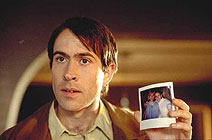|
|
|
|
Stealing Harvard
|
 |
|
American movies so often strive to depict a classless society. It is only at the extremes of commercial production that class is allowed to emerge as an issue. Solemn art movies like In the Bedroom (2001) posit a stark divide between the comfortably affluent and the seethingly dispossessed. In trashy comedies, members of the lower classes are either affirmed as the bearers of earthy authenticity or mocked as freaks. Stealing Harvard is a low-rent comedy that tries to have it both ways on the subject of those it gleefully labels trailer trash. On the one hand, John (Jason Lee), stuck in his respectable relationship with the upwardly mobile Elaine (Leslie Mann), needs to get back to his vulgar origins. On the other hand, this underclass seems to be populated solely by losers, criminals, psychotics and nymphomaniacs – a standard middle-class projection. Despite the expectations generated by its title, the film does not get anywhere near Harvard. In order to help pay his niece’s university enrolment fee, John turns to his old and rather disturbed chum, Duff (Tom Green) – a character that seems to have been inspired by the splendid documentary American Movie (1999). Several nights of bungled thefts and scams build up the usual posse of hoods, cops and vigilante citizens on the trail of our desperate heroes. It is sad to see director Bruce McCulloch (Superstar, 1999) saddled with such thin and lifeless material, dutifully padded out with obligatory gags evoking transvestism, incest and bestiality. Character actors including Seymour Cassel and Chris Penn are wheeled on for a few minutes of low-life, tough-guy schtick. Only a surprise mid-way turn in Elaine’s character provides any momentum or fun. Although taking the main part, Lee is essentially the straight man who offsets Green’s supposedly zany humour. Green comes from a school of comic improvisation that requires him to rhetorically overemphasise every explanation and gesture, no matter how banal. This means that even a passing reference to his van can take around twenty seconds, as he riffs on words ("This van, my van"), points histrionically, pounds the door, and so on. A bunch of out-takes after the end credits faithfully collect his least witty inventions. © Adrian Martin November 2002 |
![]()